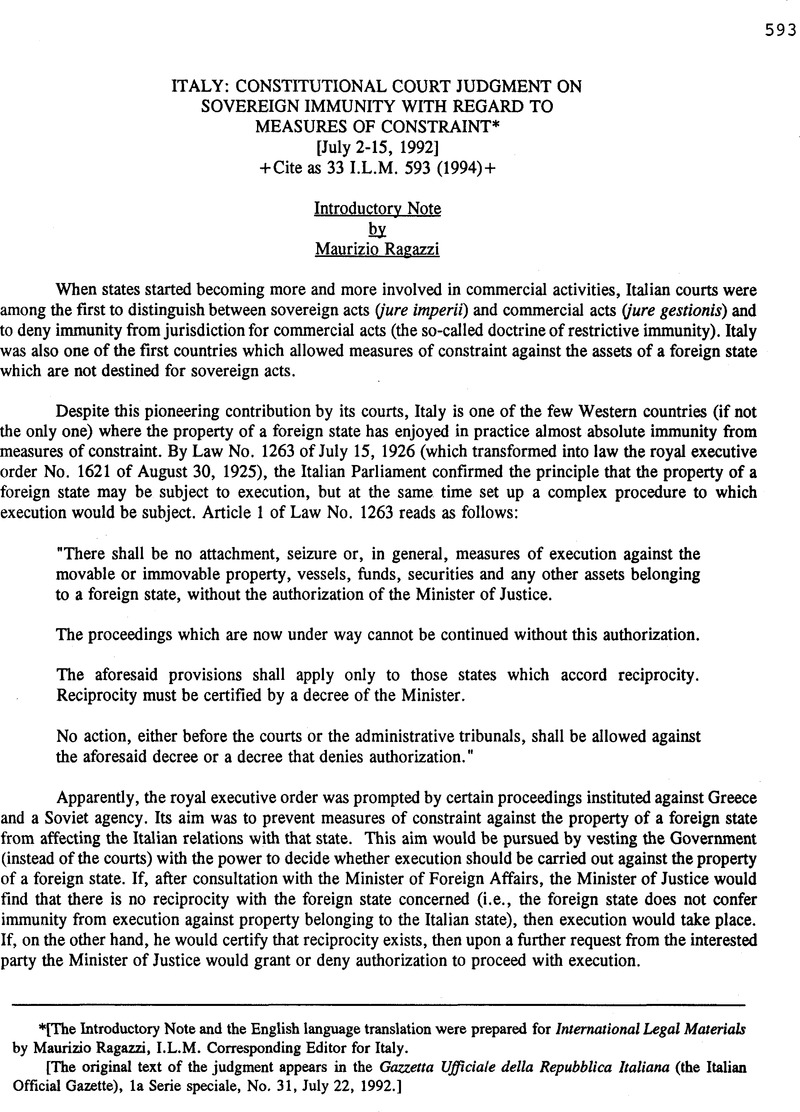No CrossRef data available.
Article contents
Italy: Constitutional Court Judgment on Sovereign Immunity with regard to Measures of Constraint
Published online by Cambridge University Press: 27 February 2017
Abstract

- Type
- Judicial and Similar Proceedings
- Information
- Copyright
- Copyright © American Society of International Law 1994
References
* *[The Introductory Note and the English language translation were prepared for International Legal Materials by Maurizio Ragazzi, I.L.M. Corresponding Editor for Italy.[The original text of the judgment appears in the Gazzetta Ufficiale delta Repubblica Italiana (the Italian Official Gazette), la Serie speciale, No. 31, July 22, 1992.]
1 More information on law No. 1263, in English, can be found in Luigi Condorelli & Luigi Sbolci, Measures of Execution against the Property of Foreign States: the Law and Practice in Italy, 10 Neth. Y.B. Int'l L. 197 (1979). See also the Seventh report on jurisdictional immunities of States and their property by Mr. Sompong Sucharitkul, Special Rapporteur, [1985] 2 (Part One) Y.B. Int'l L. Comm'n. paras. 49-51, UN Doc. A/CN.4/388; di Brozolo, Luca G. Radicati, Italian Case Note, 84 AJIL 573 (1990)CrossRefGoogle Scholar. An exhaustive list of Italian ministerial decrees adopted pursuant to law No. 1263 appears in LUCA G. Radicati Di Brozolo, La Giurisdizione Esecutiva E Cautelare Nei Confronti Degli Stati Stranieri 298, note 14 (1992).
1 [“All citizens have the same social dignity and are equal before the law, without distinction of sex, race,language, religion, political opinions, personal and social conditions.The Republic has the task of removing the economic and social obstacles which, by restricting in practice the freedom and equality of citizens, impede the full personal development and the effective participation of all workers in the political, economic and social organization of the country.“]
2 [“All can take judicial action to protect their rights and legitimate interests.The right of defense is inviolable in every procedural state and grade.Destitute persons are assured, by appropriate means, the capacity to take judicial action and defend themselves before a court.The law determines the conditions and the procedures for redress of judicial errors.“]
3 [“No personal service or levy can be imposed without a law.“]
4 [“Private economic initiative is free. It cannot be exercised in conflict with the social interest or in a way prejudicial to security, freedom and human dignity.The law determines the appropriate programs and controls in order that public and private economic activity may be directed towards, and coordinated with, social ends.“]
5 [“The Italian legal system conforms to the generally recognized rules of international law.The legal status of the foreigner is governed by law in accordance with international rules and treaties.The foreigner, who in his or her country is denied the effective exercise of the democratic freedoms guaranteed by the Italian Constitution, has the right of asylum in the territory of the Republic, in accordance with the conditions established by law.Extradition of a foreigner for political crimes is forbidden.“]
6 [“In the cases established by law, private property can be expropriated for reasons of public interest, subject to compensation.“]
7 [“Italy rejects war as an instrument of offense to the freedom of other peoples and as a means for the settlement of international disputes; it consents, on a foot of equality with other States, to restrictions on its sovereignty which are necessary for a legal order that would ensure peace and justice among nations; it promotes and favors the international organizations which aim at achieving this end.“]
8 [“The debtor is liable for the fulfillment of all obligations with all his or her present and future assets. Restrictions on liability are not admitted except in the cases established by law.“]
9 [“The obligation can be performed by a third party, even against the creditor's will, if the creditor has no interest in that the debtor personally performs the obligation.However, the creditor can refuse the performance offered by a third party, if the debtor has communicated to the creditor his or her opposition to it.“]


